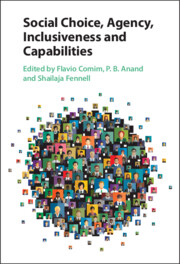Book contents
- Social Choice, Agency, Inclusiveness and Capabilities
- Social Choice, Agency, Inclusiveness and Capabilities
- Copyright page
- Contents
- Figures
- Tables
- Contributors
- Preface and Acknowledgements
- 1 Introduction: social choice, agency, inclusiveness and capabilities
- Part I Social Choice and Capabilities
- Part II Inclusiveness, Social and Individual Agency
- Part III Social Choice and Capabilities in Action
- Index
- References
1 - Introduction: social choice, agency, inclusiveness and capabilities
Published online by Cambridge University Press: 28 March 2024
- Social Choice, Agency, Inclusiveness and Capabilities
- Social Choice, Agency, Inclusiveness and Capabilities
- Copyright page
- Contents
- Figures
- Tables
- Contributors
- Preface and Acknowledgements
- 1 Introduction: social choice, agency, inclusiveness and capabilities
- Part I Social Choice and Capabilities
- Part II Inclusiveness, Social and Individual Agency
- Part III Social Choice and Capabilities in Action
- Index
- References
Summary
This chapter provides an overview of the books main issues and how they constitute a key narrative for understanding the links between Amartya Sens social choice theory (SCT) and other elements of his capability approach. It invites its readers to a long interdisciplinary journey, from an acknowledgement of the SCT features in Sen’s work to rich analytical categories that expand the core of SCT towards new forms of social theorizing. More specifically, it reviews the main features of Sen’s SCT and discusses a wide range of issues related to collective choices and individual values, such as those of consensus building, institutional change, identity perceptions, inclusiveness, notions of agency, the role of moral sentiments and emotions in shaping social choice, an ethics of sufficiency versus an ethics of optimal social capability, the influence of psychological aspects on individuals’ choices and the role of social structures in shaping people’s social priorities. It covers a wide range of empirical cases, and advances a proposal for a broader notion of social choice that can be richer, more interdisciplinary and more useful to human development theory and policies.
- Type
- Chapter
- Information
- Publisher: Cambridge University PressPrint publication year: 2024



